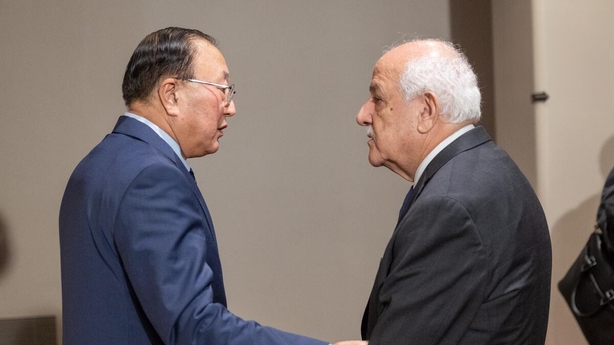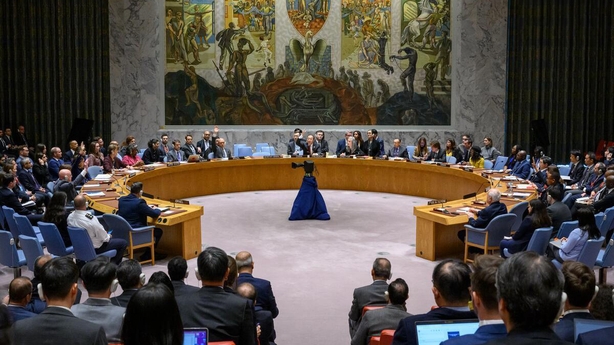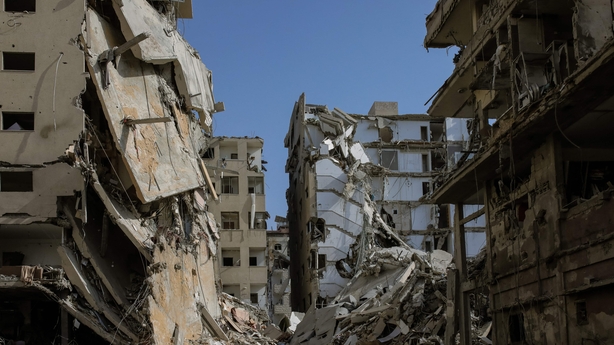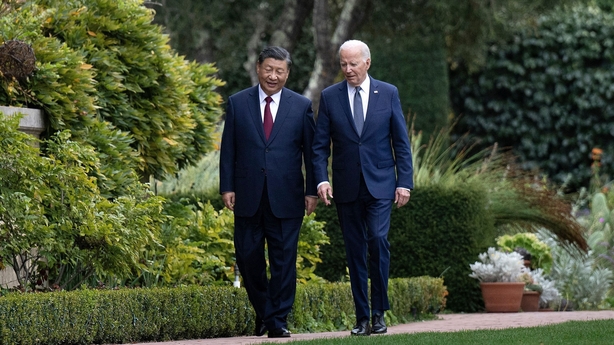It took 40 days for the UN Security Council to come up with a form of words to address the spiral of violence in the Middle East.
In that time, some 12,000 people were killed.
On Wednesday, a call for "extended humanitarian pauses for a sufficient number of days" squeaked through the Council, this time without any vetoes from the permanent members, although three abstained.
It was the fifth time the Council had voted on a text.
Why did it take so long?
The simple explanation is that there was no getting the word "ceasefire" past the United States, Israel's staunchest ally.
But there’s more to the Security Council deadlock. After all, China and Russia used their vetoes to block resolutions and statements on the war too.
Behind the voting lies a complex web of sometimes mutual but often clashing great power interests in the Middle East and an uneasy jostle for influence in a shifting global order.
Russia and China stand to gain from a rise in anti-US sentiment at the UN while burnishing their credentials as champions of the Global South.
But they also have a lot to lose, if a wider conflagration engulfs their economic and strategic interests.
The view from Beijing
In November, China took over the rotating presidency of the Security Council.
Addressing reporters at UN Headquarters on the first day of his new role, the Chinese Ambassador to the UN, Zhang Jun, said his mission would "spare no effort" moving the Council towards a humanitarian ceasefire.
This week, Ambassador Zhang, flanked by the envoys of Palestine, the United Arab Emirates and other Arab nations, held a news conference after the successful adoption of the Security Council resolution.
The optics sent a powerful message that China is standing shoulder-to-shoulder with the Arab world and, by extension, the Global South.

China’s interests here include chipping away at the US’s influence in the Middle East, undermining its moral standing and winning the support of more than 50 Islamic states around the world for its policies in Xinjiang, Tibet and Taiwan within the UN, especially at the Human Rights Council - Ahmed Aboudouh, from the Middle East and North Africa program at Chatham House, a UK think tank, told RTÉ News.
This is where China and Russia’s interests converge.
Beijing stands to benefit from Moscow’s more incendiary language against the West, whilst positioning itself as a responsible global player.
"China is pushing Russia to the frontlines," Mr Aboudouh said, "but China is leading from behind."
Don’t forget the oil. China is heavily dependent on the region for energy imports, including more than half its oil.
Fostering closer ties with top fossil fuel producers like Saudi and Iran have been prioritised.
And, earlier this year, Beijing brokered a rapprochement between Riyadh and Tehran, two long-time enemies, in what was seen as a major diplomatic coup.
Politically, it’s no secret that Beijing supports that Palestinian cause. It’s a policy often seen as anti-US positioning that dates back to the time of Chairman Mao.
But, in recent years, China and Israel have drawn closer. Chinese investment in Israel’s technology and innovation sectors is of particular interest to Beijing.

In fact, Israel’s prime minister, Benjamin Netanyahu, was due to travel to China this autumn, before the attacks by Hamas changed everything.
Now, Israel says it is "disappointed" with China’s reaction to the conflict.
"We expect China to condemn Hamas and support Israel's right to self-defence," a spokesperson for the Israeli mission to the UN told RTÉ News.
That won’t happen.
China vetoed a Security Council text and voted against an amendment to a General Assembly that did.
It’s not that China doesn’t condemn Islamic terrorism per se.
A jihadist threat is how it justifies the crackdown on Uyghur and other Muslim minorities in Xinjiang, which the UN’s former High Commission for Human Rights said may amount to "crimes against humanity".
When the Trump administration took the East Turkestan Islamic Movement off its list of designated terrorist groups, Beijing responded with fury.
China’s Foreign Ministry spokesperson, Wang Wenbin, scolded the US for its "repulsive practice of condoning terrorist groups as it sees fit".
"Terrorism is terrorism," he said.
But, when it comes to the atrocities committed by Hamas, China is more circumspect.
The Chinese Mission to the UN declined to answer a direct question from RTÉ News on the matter.
All this points to the gulf between China’s domestic and foreign policies, according to analysts.
"Anyone inside China who challenges CCP rule and/or the illusion of a unified multi-ethnic state is vociferously condemned as a terrorist, a separatist, an extremist, or all three," Andrew Scobell, from the US Institute of Peace, a think tank, told RTÉ News
Outside China, Beijing tends to avoid taking sides or public positions, especially in the Middle East, which is key to Beijing’s quest for influence in a Global South increasingly disgruntled with US foreign policy and military interventionism.
This approach extends to a "values-free, transactional diplomacy, in pursuit of its own considerable economic interests in the region" according to Mr Scobell, so that Beijing is "willing to work with brutal regimes such as those in Tehran and Damascus".

Beijing has strengthened ties with Syria’s Bashar Al-Assad whom UN experts have accused of using chemical weapons against his own people.
China and Iran have grown closer too, united in a blanket rejection of what Beijing terms external forces "interfering in internal affairs" - a reference to the meddlesome tendency of governments in Europe and the US to preach human rights.
The UN Human Rights Council has documented the Iranian regime’s deadly crackdown on women’s rights protesters in the wake of the death of Mahsa Amini in the custody of the 'morality police' last year.
Iran is also believed to fund, arm and train Islamic militias, including Hezbollah in Lebanon and the Houthis in Yemen.
In the past few weeks, Washington has accused Iran-backed militias of drone and rocket attacks on US assets in eastern Syria.
But, for that reason, Beijing’s embrace of Tehran could prove useful to Washington.
The US could, for example, press China to use its leverage to rein in the Iranian regime.
Beijing, which is currently in a moment of détente with Washington after years of tension over trade, tech and more recently spy balloons, might be minded to oblige. It prizes a better trading relationship with the US to boost its slowing economy.

"Beijing is likely to stay short of trying to exploit the crisis to embarrass the US and further isolate the American position internationally," Trita Parsi of the Quincy Institute for Responsible Statecraft in Washington DC told RTÉ News.
Also, Beijing knows that, compared to the US, it lacks real clout on the ground.
The Communist Party leadership also has an extreme aversion to risk, according to Mr Scobell, which means it could be seen as a "great power lite".
Stability is what matters most to a rising power with heavy energy dependency on the Middle East. And the US still has the most influence, not to mention military bases, in the region.
Russia’s military is active there too, looking after its own interests and supporting its war effort in Ukraine.
The view from Moscow
Russia’s only Mediterranean port and naval foothold is in Tartus, Syria.
In 2015, Moscow stepped up its support for the Syrian leader, Bashir Al-Assad, with troops and airstrikes.
Russia’s intervention turned the war - which has killed more than half a million people since 2011 - in the regime’s favour.
Russia has also increasingly come to depend on Iran for weapons to support its attack on Ukraine.
It stands to gain more than it loses from the Hamas-Israel conflict.
"The main benefits from Putin's perspective are the extent to which the conflict is likely to divert international attention and resources away from the war in Ukraine, particularly in the United States where public support for military aid shows signs of weakening and Republican Party infighting threatens to delay further crucial funding for Kyiv," Katie Stallard, author of Dancing on Bones: History and Power in China, Russia, and North Korea told RTÉ News.
US-led diplomacy in the region, such as normalisation talks between Israel and Saudi Arabia, which had threatened to marginalise Russia's influence, are also likely to be disrupted in another win for Moscow.
It will want to exploit the perception, particularly in Arab states and the Global South, that the US - and the wider West - is enabling the Israeli assault on Gaza and failing to live up to its own professed values in terms of the protection of civilians, Ms Stallard told RTÉ News.
But there’s more at stake for Russia on the ground. It doesn’t want to have to divert its own resources away from the ground war in Ukraine.
"Putin would much prefer to see a long, slow-burning conflict that draws the US back into the Middle East, rather than a major regional war that threatens its own strategic interests," Ms Stallard said.
On Wednesday, the Chinese Ambassador to the UN basked in praise from member states for presiding over the successful passage of the resolution during his presidency.
While the US Ambassador had to fend off spiky questions on why the US blocked previous Council action while civilians were dying.
If the UN is any barometer of great power rivalry, this week China came out on top.






